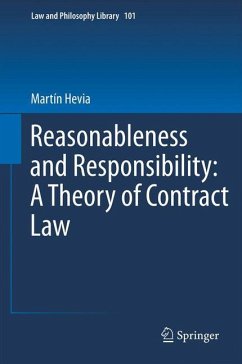If, as John Rawls famously suggests, justice is the first virtue of social institutions, how are we to understand the institution of contract law?
This book proposes a Rawlsian theory of contract law. It argues that justice requires that we understand contract rules in terms of the idea of reasonable, terms of interaction - that is, terms that would be accepted by reasonable persons moved by a desire for a social world in which they, as free and equal, can cooperate with others on terms they accept. On that basis, the book explains the main doctrines of contract law, including those governing third parties, in both the Common Law and the Civil Law.
This book proposes a Rawlsian theory of contract law. It argues that justice requires that we understand contract rules in terms of the idea of reasonable, terms of interaction - that is, terms that would be accepted by reasonable persons moved by a desire for a social world in which they, as free and equal, can cooperate with others on terms they accept. On that basis, the book explains the main doctrines of contract law, including those governing third parties, in both the Common Law and the Civil Law.








